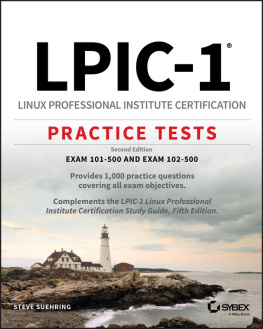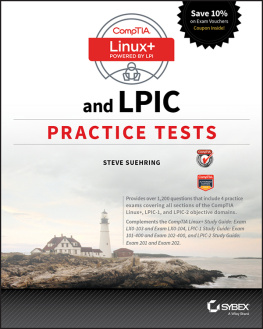LPI Linux Certification in a Nutshell
Adam Haeder
Stephen Addison Schneiter
Bruno Gomes Pessanha
James Stanger
Copyright 2010 James Stanger, Adam Haeder, Stephen Schneiter, and Bruno Gomes Pessanha
This book uses RepKover, a durable and flexible lay-flat binding.
OReilly books may be purchased for educational, business, or sales promotional use. Online editions are also available for most titles (.
Nutshell Handbook, the Nutshell Handbook logo, and the OReilly logo are registered trademarks of OReilly Media, Inc. LPI Linux Certification in a Nutshell , the image of a bull, and related trade dress are trademarks of OReilly Media, Inc.
Many of the designations used by manufacturers and sellers to distinguish their products are claimed as trademarks. Where those designations appear in this book, and OReilly Media, Inc. was aware of a trademark claim, the designations have been printed in caps or initial caps.
While every precaution has been taken in the preparation of this book, the publisher and authors assume no responsibility for errors or omissions, or for damages resulting from the use of the information contained herein.

O'Reilly Media
Preface
Certification of professionals is a time-honored tradition in many fields, including medicine and law. As small computer systems and networks proliferated over the last decade, Novell and Microsoft produced extremely popular technical certification products for their respective operating system and network technologies. These two programs are often cited as having popularized a certification market for products that had previously been highly specialized and relatively rare. These programs have become so popular that a huge training and preparation industry has formed to service a constant stream of new certification candidates.
Certification programs, offered by vendors such as Sun and Hewlett-Packard, have existed in the Unix world for some time. However, since Solaris and HP-UX arent commodity products, those programs dont draw the crowds that the PC platform does. Linux, however, is different. Linux is both a commodity operating system and is PC-based, and its popularity continues to grow at a rapid pace. As Linux deployment increases, so too does the demand for qualified and certified Linux system administrators.
A number of programs such as the Linux Professional Institute (LPI), the Red Hat Certified Engineer (RHCE) program, and CompTIAs Linux+ have formed to service this new market. Each of these programs seeks to provide objective measurements of a Linux administrators skills, but they approach the problem in different ways.
The RHCE program requires that candidates pass multiple exam modules, including two hands-on and one written, whose goals are to certify individuals to use their brand of products. The Linux+ program requires a single exam and is focused at entry-level candidates with six months experience. LPIs program is a job-based certification and currently consists of three levels; this book focuses on the most basic level.
The Linux Professional Institute
The Linux Professional Institute is a nonprofit organization formed with the single goal of providing a standard for vendor-neutral certification. This goal is being achieved by certifying Linux administrators through a modified open source development process. LPI seeks input from the public for its exam Objectives and questions, and anyone is welcome to participate. It has both paid and volunteer staff and receives funding from some major names in the computer industry. The result is a vendor-neutral, publicly developed program that is offered at a reasonable price.
LPI currently organizes its most popular Linux Professional Institute Certification (LPIC) series in three levels. This book covers the LPIC Level 1 Exams 101 and 102.
Level 1 is aimed at junior to midlevel Linux administrators with about two years of practical system administration experience. The Level 1 candidate should be comfortable with Linux at the command line as well as capable of performing simple tasks, including system installation and troubleshooting. Level 1 certification is required prior to obtaining Level 2 certification status.
All of LPIs exams are based on a published set of technical Objectives. These technical Objectives are posted on LPIs website and for your convenience printed at the beginning of each chapter within this book. Each Objective set forth by LPI is assigned a numeric weight, which acts as an indicator of the importance of the Objective. Weights run between 1 and 8, with higher numbers indicating more importance. An Objective carrying a weight of 1 can be considered relatively unimportant and isnt likely to be covered in much depth on the exam. Objectives with larger weights are sure to be covered on the exam, so you should study these closely. The weights of the Objectives are provided at the beginning of each chapter.
LPI offers its exams through Pearson VUE, Thomson Prometric, and at on-site locations at special Linux events, such as trade shows. Before registering for any of these testing methods, you need to obtain an LPI ID number by registering directly with LPI. To obtain your LPI ID, visit http://www.lpi.org/register.html. Once youve received your LPI ID, you may continue your registration by registering with a testing center or special event. You can link to any of these registration options through LPIs website.
In Vue and Prometric testing centers, the exams are delivered using a PC-based automated examination program. As of this writing, the exams are available in English , Japanese, Chinese (both Traditional and Simplified), German, Spanish, Portuguese, and French. Exam questions are presented in three different styles: multiple-choice single-answer, multiple-choice multiple-answer, and fill-in-the-blank. However , the majority of the questions on the exams are multiple-choice single-answer. Also, with the multiple-choice questions, the candidate is told exactly how many answers are correct.
For security purposes, multiple forms of each exam are available at testing centers to help minimize memorization and brain dumps of exams if candidates take them multiple times. Due to this, actual question numbers may vary slightly. LPIs psychometric team develops these forms and adjusts the scoring appropriately so all forms are equally difficult. The scores are between 200 and 800, and passing score is 500.
Audience for This Book
The primary audience for this book is, of course, candidates seeking the LPIC certification. These may range from administrators of other operating systems looking for a Linux certification to complement an MSCE certification to Unix administrators wary of a growing pool of Linux-certified job applicants. In any case, this book will help you with the specific information you require to be successful with the Level 1 Exams. Dont be fooled, however, as book study will not be enough to pass your exams. Remember, practice makes perfect!
Due to the breadth of knowledge required by the LPI Objectives and the books one-to-one coverage, it also makes an excellent reference for skills and methods required for the day-to-day use of Linux. If you have a basic working understanding of Linux administration, the material in this book will help fill gaps in your knowledge while at the same time preparing you for the LPI Exams, should you choose to take them.






